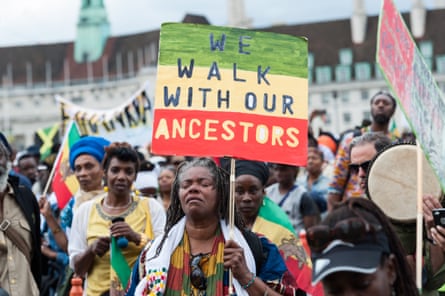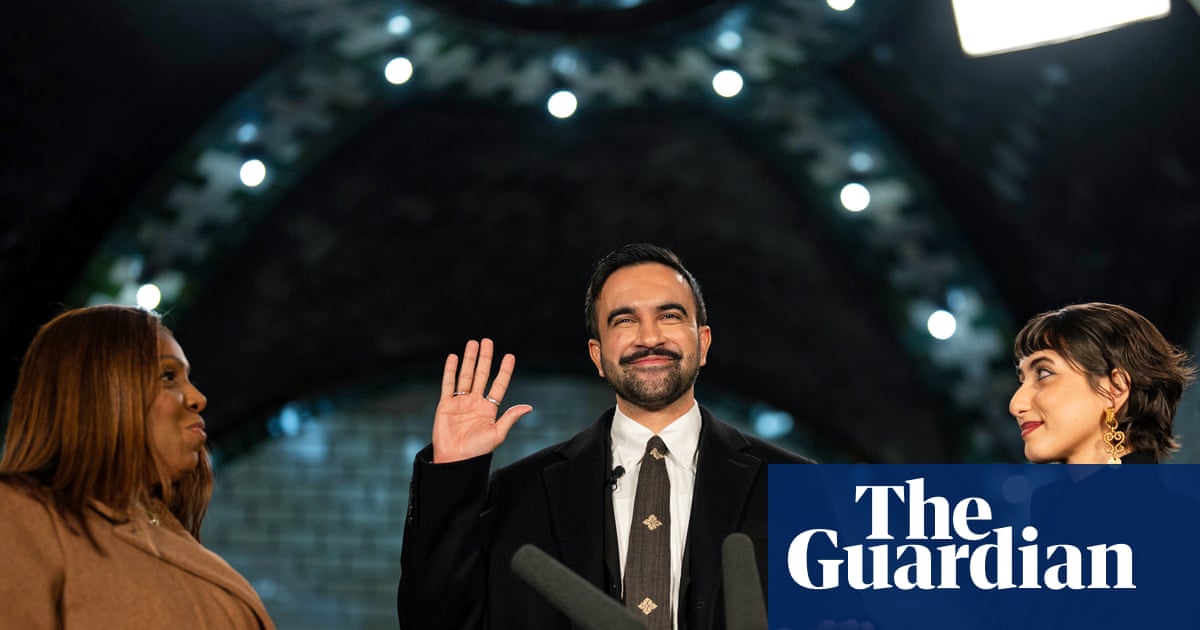‘Nobody knows how to talk about reparations,” says Lenny Henry, which is why the entertainer teamed up with his regular collaborator, media diversity campaigner Marcus Ryder, to write a book about it: The Big Payback: The Case for Reparations for Slavery and How They Would Work. Triggered by the revelation that the British government only finished paying off its debts from compensating slave owners for abolishing slavery in 2015, Henry and Ryder spoke to economists, politicians and race relations experts about how to tackle this most contentious of topics, maintaining their sense of humour throughout.
When did you start thinking about reparations?
Marcus Ryder: It’s always been part of the Black dialogue, but in terms of me thinking about it with Lenny, it was 2014 right? You might not remember this Lenny – it’s like we’re a married couple …
Lenny Henry: We should be on Mr and Mrs.
MR: It was 2014 and Lenny and I were putting together the idea of diversity tax breaks, for if you meet certain inclusion criteria in television or film production. And Lenny called me up and said: “This is reparations.” I’d never thought of it in that way before.
LH: Then they announced that they had finished [paying off the debt for compensating] the ex-slave owners in 2015. We’d been paying it off too. So the descendants of slaves were paying for their enslavement. And a lot of people in the Black community were like, as African Americans would say: “Ain’t that some shit?” There was kind of a raised eyebrow and a depressed, “Well, what can you do?” And we thought, “We should do something about this.”
What was your concept of what reparations meant before you started this book?
LH: My concept was, “gimme some money”. I’m joking, but I kept thinking, is somebody gonna give me a couple of mil? Because I know where I’m gonna live.
MR: You wanted a hot tub.
LH: I wanted the hot tub! But once you start to break it down, it goes beyond getting a cash refund for slavery. It becomes about social engineering, and – it’s going to sound really touchy-feely – but it becomes about healing, and about spiritual healing, rather than just cash. It’s hundreds of years of being oppressed and downtrodden. It’s about mental illness, mental health issues, it’s about society being rigged against you. Even if you don’t see it, the house wins every time if you’re a person of colour, and it’s been happening for 200 years.
MR: I agree with all of that, but cash does something.
LH: Cash gets you the hot tub, baby!
MR: We shouldn’t be scared to say that there is a financial element to it. If you look at other forms of reparations, like the reparations following Nazi atrocities in the Holocaust [paid by West Germany to Israel in 1952], and to the Kikuyu in Kenya by the British government [in 2013, to victims of the crackdown against the Mau Mau rebellion], there are positives and negatives and flaws in both of those examples, but they do involve money. But Lenny’s also right: money’s not going to solve the actual structural racism.
It feels as if money is the part people are least keen to talk about.
LH: Only because it’s so huge. They’re frightened, because if you wanted to do actual reparations, it would cost trillions and trillions of pounds. [The Brattle Report calculated that Britain owed £18.6tn in reparations for its part in transatlantic slavery, taking into account criteria such as forgone earnings, loss of liberty and personal injury].
MR: When we look at history, when the debate about the abolition of slavery was live, one of the ways in which it got scuppered is that people would try to circumnavigate whether slavery was right or wrong, and then just jump to the money compensation bit. So they wouldn’t properly engage with “slavery is wrong”; they would just say, “We can’t afford to get rid of slavery, because the whole British economy would fall apart.” So we needed to agree on that first: slavery was wrong. And it was absolutely flawed that they ended up paying slave owners and not the slaves who they were freeing at the time, or the descendants of slaves, but it was agreed that slavery is wrong. You shouldn’t let the practical actually hinder the moral argument, right?
LH: Preach!
MR: The moral argument is that we deserve compensation. We deserve reparations. Let’s get that agreed, and how we’re going to get the money, or how much money – that is a secondary concern.
What about the point that national governments, like the UK, simply can’t afford to pay?
MR: Even though it sticks in our throats that we were still paying for the compensation to slave owners until 2015, that’s a really good example of how you borrow money and pay it back over a long period of time. There’s loads and loads of ways. And so people should not be scared that reparations would bankrupt Britain.

Is there a road map for how reparations would actually work?
LH: There’s the Caricom [Caribbean Community] plan, which has 10 points. It’s very succinct. [Reading from his phone] The first is: “A full formal apology for the transatlantic slave trade.” It’s difficult, though, because that makes people feel complicit, and they don’t like saying it; “an Indigenous peoples’ development programme; funding for voluntary repatriation to Africa; the establishment of cultural institutions and the return of cultural heritage; assistance in remedying the public health crisis; education programmes; the enhancement of historical and cultural knowledge exchanges; psychological rehabilitation as a result of the transmission of trauma; the right to development using technology; debt cancellation and monetary compensation.” So Caricom governments were saying that the legacy of slavery left Caribbean countries so poor that they’ve had to borrow money simply to keep their economies afloat, and that debt is a vicious cycle, as the countries have to borrow more money just to pay off their old debt. Cancelling that debt is critical if you’re going to properly overcome the legacy of slavery.
A common objection to reparations is: slavery happened centuries ago, why should we pay today for something we had nothing to do with?
LH: I think it’s owning where your birthright comes from, isn’t it? If you benefited from it, then you probably need to consider how you can pay it forward. If you’re really rich because 400 years ago, your ancestors did some shit, then you should be thinking about, “what can I do to help society and help the people that my ancestors oppressed?”
MR: You can look at key individuals who have really benefited, but it’s also about institutions. If you look at the UN security council, there isn’t an African country or a majority Black country on it as a permanent member. Or when the Bretton Woods agreement institutions [such as the International Monetary Fund and the World Bank] were created after the second world war, they were clearly framed not for the benefit of but detrimentally to African and Caribbean countries and South American countries as well. So we need to change those institutions. Because, even though your billionaire or your millionaire family living in their country estate gives money, if you don’t change the actual power dynamics, it’s little more than charity.
Another argument would be: you’re relatively well off, why should poor, white Britons today pay for your hot tub?
MR: Nobody says, why should the white working-class guy in Bradford pay for my kid or Lenny’s kid to go to school? But that’s what’s happening. They pay tax, they pay VAT, they pay income tax. My kid goes to a state school – that pays for him to go to school. Nobody questions that. It’s so insidious – where we look at the poor working class, and we try and pit white working-class people against Black people. Or we try and pit one deserving group against another.
Given what’s going on in Britain today, looking at the far right rally earlier this month in London, for example, does it feel as if some people won’t exactly be receptive to discussions about reparations right now?
LH: That doesn’t stop you from having the idea in your head. It doesn’t stop you from talking about what we can do to change things. How can we educate people in a way that makes them understand a few more of the issues than the ones they’ve got at present?
MR: The problem with so many antiracists, the problem with so many progressives, is that we are reactive. We’re like, “Oh, there’s a march over there. Let’s react to the agenda that they’re setting.” Yes, we do need to respond to that agenda, but we need to also be confident in setting our agenda.
LH: I don’t want to wait for anyone to tell me when’s a good time.
MR: Just because there is a march of flipping Tommy Robinson and his crew over there, that shouldn’t stop us from talking about the issues that are really important to us.
Could reparations benefit Britain?
LH: I think there’d be a nationwide sigh of relief if something that has been unspoken for so long … we began the process to actually figure out how to redress this balance. Everybody would just go, “Oh, thank God.” Because we’re so scared to talk about it. We know it’s been there in the background, throbbing away, and somebody’s trying to give it a massive shot of penicillin to get rid of this feeling that something is wrong, but we’re not allowed to embrace and discuss it.
MR: If Britain starts making reparations, it would change the relationship and the dynamic it has with Africa, with India, the Caribbean, with lots of different emerging world powers. It will benefit trade and the British economy if we have better relationships with all these countries.
LH: It’s like Britain has still got to wear a colonialism/empire coat [in] every meeting it goes into with these emerging nations, and they’re going, “you’ve still got that coat on”. The world is changing. There’s a big elephant in the room, and everybody needs to address it and move on.
MR: What was really weird about writing this book is that we’re writing about something that, on the one hand, seems really old, but every month, something was happening in the world which meant that we had to change what we were writing. There was a meeting of Commonwealth countries about a year ago, and a lot of the Caribbean countries wanted to talk about reparations. And Keir Starmer tried to say, “No, we’re not going to talk about reparations.” But, in the end, they did. And it made Britain look weak with regards to other Commonwealth states. We’ve got to be ahead of the curve.
You even suggest reparations could help end racism.
MR: Racism is not just about one individual not liking another because they’ve got more melanin in their skin. Racism is a structural problem with values that go back to the roots of slavery and colonialism. And so if reparation is about making repair, it’s about education, mental health reparations, making sure that white people and society fully understand the legacy of slavery. The damage of slavery manifests itself in current racism.
How optimistic are you that you’ll see results any time soon?
MR: That was not a question that was put to the Black people on a slave ship who had a mutiny and fought against the slave owners. Nobody said, “Why are you fighting on your slave ship? Because, you know what? That’s not going to change the whole of slavery back in Jamaica and where you’re going.” We need to stand up for what’s right. And we need to make sure these issues are addressed. And if that means that reparations, or some form of reparations, can come about next year, fantastic. If it means it comes in 100 years, fantastic.
LH: These things take time. Look how long it took to abolish slavery. Look how long it took to pay for slave owners’ loss of work and earnings. This is to try and push the dial so that the conversation begins that might lead to something, and that might take, very optimistically, another 100 years, another 150 years. We start the conversation so we can get on with it.
This interview has been edited for brevity and clarity.
-
The Big Payback: The Case for Reparations for Slavery and How They Would Work (Faber, £12.99). To order a copy for £11.69, go to guardianbookshop.com. Delivery charges may apply.

 3 months ago
49
3 months ago
49

















































